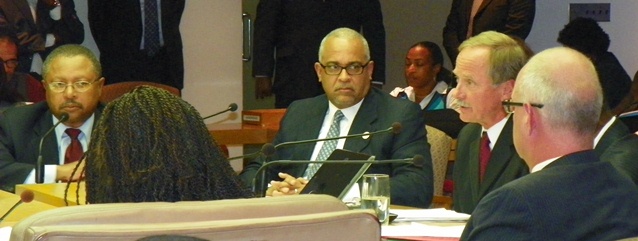
(R to L) DEGC CEO George Jackson, Deputy Mayor Kirk Lewis, State DNR Director Keith Creaugh, M-DOT DIrector Kirk Stuedle try to sell Belle Isle lease to Council.
- Allowed Sept. 25 presentation by state, DEGC, Bing administration
- Brown, Tate, Jenkins, Cockrel, Jr. others considering revisions
By Diane Bukowski
Oct. 17, 2012
DETROIT— The unexpected cancellation of the City Council Oct. 18 committee hearing on Belle Isle, described in the story above, came in the wake of a Sept. 25 Council discussion which showed many members inclined toward considering a revised “lease” of the island to the state.
“All parties involved need a clear understanding of whether it is the will of the body to move forward to negotiate changes to the lease, or just shut it down,” Council President Pro-Tem Gary Brown said at the beginning of the Sept. 25 discussion. “If there’s no support for a lease under any circumstances, then a discussion is a waste of time.”
Councilwoman Brenda Jones asked that the matter be referred back to committee to hear other proposals including a previous Belle Isle Master Plan.
Councilwoman JoAnn Watson noted the council was still waiting for an opinion from Corporation Counsel Krystal Crittendon regarding the legality of the “lease,” since state law requires an assessment of the value of any municipal property prior to a sale or lease. No such assessment has been done.
The proposed ‘lease’ is actually a grant, since it charges the state no rent for a 30-90 year period, like the Detroit Yacht Club’s occupation of Belle Isle land for $1 a year.
Councilman Kwame Kenyatta, who opposes any lease, boycotted the discussion.
The Council moved ahead anyway with a presentation from Detroit Economic Growth Corporation (DEGC) CEO George Jackson, Deputy Mayor Kirk Lewis, State Department of Natural Resources (DNR) Director Keith Creagh, former DNR Director and current advisor to Michigan Governor Rick Snyder Rodney Stokes, Michigan Department of Transportation (M-DOT) Director Kirk Stuedle, Detroit General Services Director Brad Dick, and other officials.
During the discussion, several Council members said they supported the concept of the lease, with revisions including the hiring of Detroit residents and businesses.
Pugh said, “I would be willing to vote for the right lease, not just any lease. I want to hear the other proposals.” Cockrel, Jr. said the concept needs “further discussion,” but that he wants to see other aspects of the controversial Financial Stability [consent] agreement effectuated first.
Tate said, “I believe the majority of the body is willing to entertain the proposal, but we just don’t want it shoved down our throats. There is a problem with trust and respect.”
No federal agency was at the table, although Belle Isle is listed on the federal National Registry of Historic Places.(Go to http://detroit1701.org/Belle%20Isle.html from that registry, which includes an inspiring description of the island as one of the most beautiful venues in the country.) It is also listed on the State of Michigan Registry. Previously, the U.S. government had to approve the building of the MacArthur Bridge, according to old Common Council records. The U.S. also operates a Coast Guard facility on the island which now lists the Office of Homeland Security on its sign, since Belle Isle is a national border property.
There is also no inclusion of the federal government in the proposed lease document. For full lease with attachments, click on Proposed Belle Isle lease with attachments. The city has published the lease without attachments on its website, and did not provide Council with them until the Sept. 25 hearing. Lewis said Bing himself did not have them at the time of his press conference with Michigan Governor Synder announcing the proposed lease.
At no point in the discussion did representatives from the state commit to spend any dollar amount on the Island, although they did indicate their interest in issuing bonds. Lewis said that a 30-year initial lease is necessary to obtain bond money. Creagh said the state would possibly issue a $20 million bond.
Watson said, however, that under the 2005 Belle Isle Master Plan, the city had already committed to obtaining $248 million through bond sales for park improvements.
“It is a wonderful Master Plan, with a funding strategy to raise the money and make Belle Isle a revenue-producing entity, with sponsors and private contractors paying the city.”
Councilman Kenneth Cockrel, Jr. commented that the two 30-year renewals are virtually automatic, and that he expects the city will have an economic recovery prior to the end of the first 30 years.
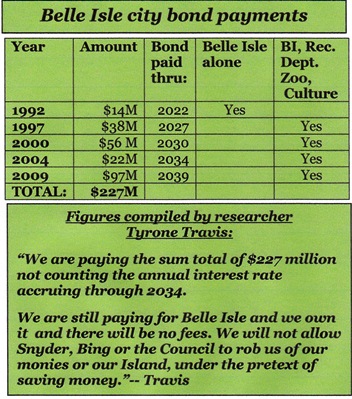 Tyrone Travis of Free Detroit-No Consent and the Coalition to Stop Privatization and Save Our City earlier listed $272 million in bond issues related to Belle Isle that are still being paid by Detroiters through the year 2039. (See box and click on Tyrone 9 17 12. )
Tyrone Travis of Free Detroit-No Consent and the Coalition to Stop Privatization and Save Our City earlier listed $272 million in bond issues related to Belle Isle that are still being paid by Detroiters through the year 2039. (See box and click on Tyrone 9 17 12. )
Creagh said, “The DNR does parks, and does it well. We clean restrooms and pick up the trash every day. We have foresters, fishery experts, biologists, and hydrologists who are experts.”
He said the city and state would jointly develop a security plan, with state troopers and park rangers (who are also troopers, according to the state website) patrolling the park.
Charles Pugh and Gary Brown questioned the sensitivity of state troopers, who are mostly non-Detroit residents and mostly white, to the needs of Detroiters utilizing Belle Isle.

- Rick Olson sat in audience during hearing; he proposed a gate to bar entrance to Belle Isle after 10 p.m.
“There is a proposal from the DNR for a six-week high impact plan involving putting up a security gate to close the park after 10 p.m,” Watson said. “I presume Gov. [Rick] Sndyer’s name would be on it.” Creagh said that DNR Parks Director Rick Olsen came up with the plan, but that it was no longer being considered.
Other Council members expressed concern regarding whether state park regulations would accommodate events like family re-unions and picnics on the island.
Stuedle said the proposal involves the jurisdictional transfer of all Belle Isle roads from E. Grand Blvd. over the bridge onto the island, making them into state “trunklines,” despite the state’s contention that the city would continue to own Belle Isle under the agreement. The transfer would be for the “life of the lease,” Stuedle said.
He added that any federal or state grants for the roadways “will stay with the roadways.” Previously, those grants went to the city of Detroit.

Recreation Dept. AFSCME Local 542 President Phyllis McMillon tells rally Sept. 22 that there are only four permanent workers on Belle Isle, who have already been re-assigned.
“The administration believes the lease will save $6 million a year, free up 36 city employees, and police who will not have to patrol the island,” said Lewis. “The plan to make Belle Isle a state park will return it to being a jewel of the city, with canoeing, horseback riding, and better upkeep. We have some of the best, highly-valued state parks in the country.”
Lewis said he was not aware of any other proposals on the table, including the 2005 Belle Isle Master Plan, which Councilwoman JoAnn Watson raised.
At a rally Sept. 21, AFSCME Local 542 President Phyllis McMillon said, “Bing told a lie when he said we have 36 workers here. There are only four permanent workers, the rest are seasonal from April to September. The seasonals are being laid off Sept. 23, and the four permanent workers have been re-assigned even though the lease deal is not approved.”
Dick told the Council there is no guarantee regarding how long any of those workers will be retained in other positions in the future.
Pugh asked if there would be a commitment to hire Detroit residents under a state ‘lease.’ Stokes said he “could not give a guarantee on the numbers,” but said “we will work our darndest” to do so. He said he already works with “Clean Detroit,” run by Roger Penske, which coordinates with Goodwill Industries. Both groups pay sub-standard wages for work seven days a week, previously done by city employees at union wages and benefits..
SEE VIDEO BELOW
Creagh added that the plumbers and electricians unions are donating volunteer labor.
The state representatives discussed other details of the lease, including the $10 a year “Recreation Pass” required for motor vehicle entrance, the routing of federal funding, grants and endowments through the state instead of the city, and an 11-member Advisory Council dominated by gubernatorial appointees. These issues were discussed in an earlier VOD article at http://voiceofdetroit.net/2012/09/15/90-yr-belle-isle-lease-entry-fees-go-to-state-fedstate-cops-to-patrol-council-hearing-mon-sept/.
 Only the Belle Isle Conservancy would partner with the state, although Jackson said they were not involved in drafting the proposed “lease.” (See sidebar with board members.)
Only the Belle Isle Conservancy would partner with the state, although Jackson said they were not involved in drafting the proposed “lease.” (See sidebar with board members.)
Among other issues, the presentation revealed that the lease is likely part of a larger plan to develop prized riverfront property including Belle Isle for the benefit of the wealthy.
Stokes said the state plans to convert both east and west Detroit riverfront land and has already invested millions on the east coast of the river. Those funds have not gone to the city, however, but to the wealthy, private Detroit Riverfront Conservancy and other private entities.
According to a Sept. 2011 release from the DEGC, the remediation of the old Uniroyal site, now known as Belleview, just west of the Belle Isle bridge is currently underway, with the Riverfront Conservancy using part of the site to finish development of its Riverwalk.
“Bettis/Betters Development, LLC, holds an agreement with the Detroit Brownfield Redevelopment Authority to develop it,” said the release.
Former Detroit Lions football star Jerome Bettis and Pittsburgh developer C.J. Betters are the partners. Job Site Services of Bay City, Michigan, Blaze Contracting of Detroit, E.C. Korneffel of Trenton, Stantec of Alberta, Canada, and Wade Trim of Detroit are contractors.
An earlier release said “Plans for the 44-acre site call for a mixed-use development consisting of different levels of housing and up to 1 million square feet of commercial space.”
Bettis said housing would consist of “upscale condos” along with retail developments.
(Comments and photos from public at hearing will be up shortly.)

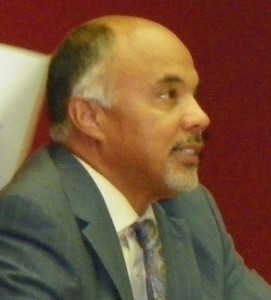

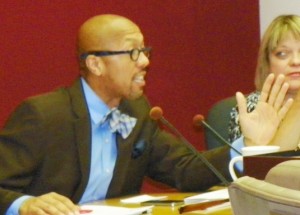


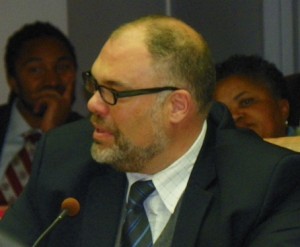






I don’t even know the way I stopped up right here, but I assumed this put up was good. I don’t recognise who you are but definitely you’re going to a well-known blogger in case you aren’t already 😉 Cheers!